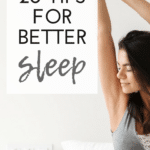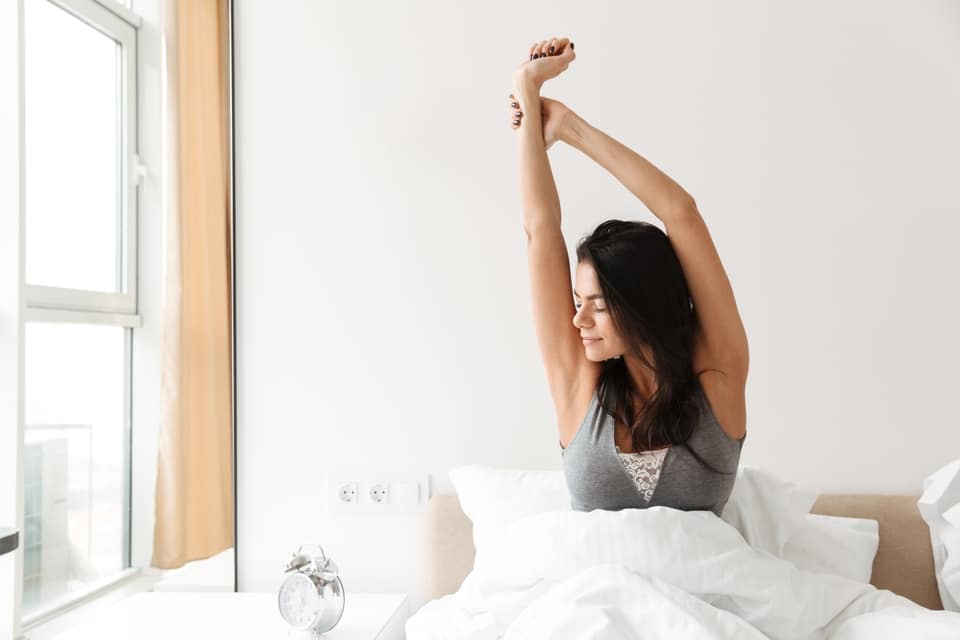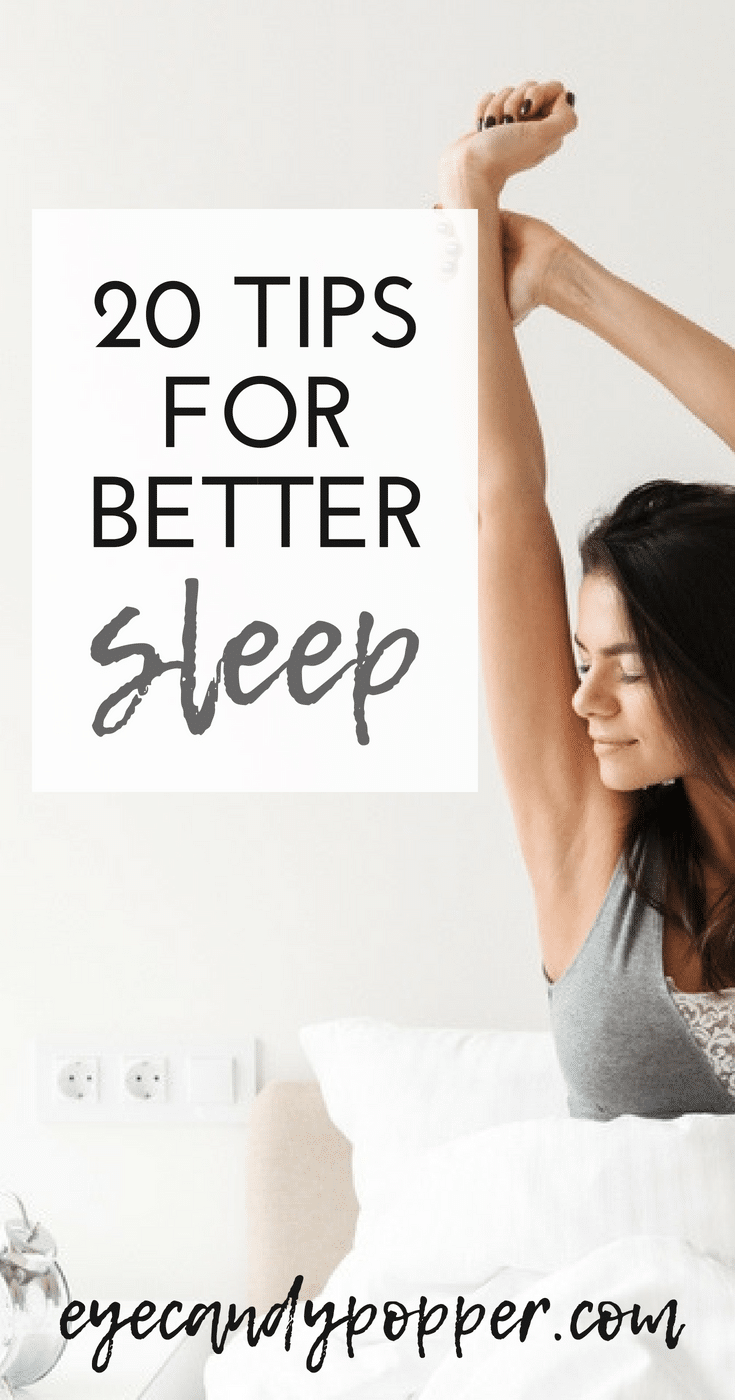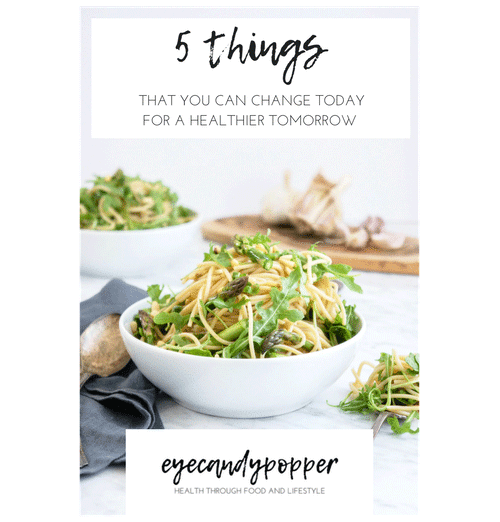Have you figured out some of the causes why you might be suffering from sleeplessness? Did you know that sleeping is just as important as eating healthy foods and exercising? In fact, if you don’t sleep properly, you will not perform as well and your body’s functions and systems will be affected. Not sleeping properly is even linked to weight gain. Do you wonder how to sleep better? Our regular health and wellness contributor Karen Carter is back today with 20 Tips For How To Sleep Better. Don’t we all want to wake up feeling refreshed like this?
How To Sleep Better?
by Karen Carter, RHN, B.A., M.Cl.Sc.
Once you’ve determined what it is that may be causing your sleep difficulties, the next step is looking for a solution! These 20 Tips For How To Sleep Better will come in handy, but if you haven’t previously read part 1 of this 2-part series about sleeplessness, you can read Sleeplessness: What Is Your Body Trying To Tell You?
The cause of your sleeplessness will determine what solution will work for you. Look through the following 20 tips to help you sleep better and pick the ones that resonate best with your challenges. These are all geared toward helping you achieve your dreamiest sleep yet!
20 TIPS FOR HOW TO SLEEP BETTER
- Exercise daily, but not within a few hours of going to bed. Exercise increases the hormone cortisol, which is stimulating and can negatively affect our ability to fall asleep.
- Practice deep breathing. Try breathing in for 4 seconds, holding for 7 seconds and breathing out for 8 seconds. It’s called the 4-7-8 breath and has been shown to help with relaxation and sleep!
- Drink herbal tea in the evening and stay away from caffeine and other stimulants late in the day.
- Cut out alcohol. Alcohol can initially make you sleepy, but later in the night it will keep you up and disrupt your sleep.
- Turn off the blue screens. Set a timer on your phone and other electronics to turn blue light to amber at sunset. Most devices now have this option built-in! You just need to activate it.
- Give yourself time to unwind before going to sleep. It’s hard going from full steam to rest as soon as your head hits the pillow. Give yourself the chance to unwind and be ready for sleep.
- Adopt a ritual for getting ready for bed – put lotion on your body, spray your sheets with a natural relaxing mist (lavender oil works well), do some gentle stretching – a ritual done consistently before bed will help notify your body it’s bedtime.
- Blackout your room by turning off all lights and keeping your windows covered. Darkness will help you recognize is time for sleep, not wake.
- Lower the temperature. Ideally, sleep in a room slightly cooler then you might think is desirable during the day (20 degrees or cooler is preferable).
- Keep your bedroom quiet. Use a sleep app to help generate white noise to help drown out disruptive sounds during the night. Sleep Genius is an app used by NASA astronauts to help them sleep better in space!
- Your pets should have their own beds. Animals can be disruptive during the night and can also bring fur, dander and pollen into your bed making it difficult for restful sleep.
- Avoid heavy meals before bedtime. It probably goes without saying that eating a piece of pizza at 10 pm isn’t a good idea. It’s hard on our digestive system and hard to get to sleep on a full belly. Stick to light snacks and eat them earlier in the evening.
- Go to bed at the same time every night. This keeps your internal clock working for you! Even when it’s the weekend or when you’re on vacation, try to go to bed around the same time every night. For more info about our internal clock, check out this article from Harvard.
- Use your bed for sleeping – do your work, internet surfing and tv watching in a different room to allow yourself to associate going to bed with sleep.
- If you need to nap, nap early in the day. Napping later in the day or for long periods can decrease the drive we normally have for sleep. Keep naps short (20 minutes usually does the trick) and make sure they happen before 5pm.
- If you’re not falling asleep, get up and do something relaxing then try again. Don’t build the connection between bed and wakefulness.
- Take a warm bath. A warm bath promotes relaxation and allows your body temperature to drop after getting out, which helps to trigger sleep.
- Reduce electromagnetic signals from your electronic devices. Research shows that these fields can disrupt your production of melatonin and serotonin, which are hormones important for good rest. Turn off your phone or set to airplane mode, and charge your electronics outside of the bedroom, or at least far away from your bed.
- There is power in suggestion! Listening to a sleep hypnosis can allow your body to relax into a state of deep sleep.
- Drink enough fluid to keep you from being thirsty in the night but not so much that you’ll be up in the night to use the bathroom frequently.
Before I wish you sweet dreams, I’ll end by stressing that sleep is as important as exercising your body and having balanced nutrition – so make it a priority! I encourage you to investigate the cause of your sleeplessness then focus on some of the solutions listed above. If one suggestion doesn’t seem to do the trick, don’t be discouraged, and try something else! It’s worth the effort. Everyone is different and obtaining restful sleep is not a one-size-fits-all solution.
I hope you’re eager to try some of these tips for how to sleep better, and wish you all a blissful sleep tonight and that amazing feeling you get afterwards when you wake up refreshed and energized. Sleep well and sweet dreams!





Leave a Reply